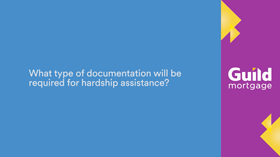Mortgage financial hardship & mortgage payment assistance
Helpful information for borrowers impacted by the government shut down
We’re here for our borrowers impacted by the government shut down. Our loan counseling staff is available to assist you in case of financial hardship. Call us at (800) 365-4884, Monday – Friday, 7:30 am–5:00 pm PT or email us at loancounseling@guildmortgage.net.
Learn more about financial hardship and mortgage assistance
Watch these videos to learn more about the steps you can take to get help if a financial hardship is impacting your ability to pay your mortgage payment.
Watch these videos next:
Loss Mitigation Application Process
Loss Mitigation Application Process
Loss Mitigation Application Process
Loss Mitigation Application Process
A change in circumstance from when your mortgage was originated that has caused you to fall behind on your payments or to be in imminent danger of falling behind on your payments. Investors will require you to provide proof of financial hardship in order to be considered for the following workout types (Modification, Partial Claim, Short Sale or Deed in Lieu). Allowable hardships may vary by investor. Please call us at 1-800-365-4884 or e-mail us at loancounseling@guildmortgage.net to request a workout package or to inquire about allowable hardships.
If your account is past due – our Loan Counseling staff will ask you to provide the reason your payments fell behind with every telephone call. We are required to report this information to your investor on a monthly basis but more importantly this will help us match the best possible mortgage financial hardship solution with your current situation.
The sooner you contact us, the more options you may have available to you. Please contact our Loan Counseling Department at 1-800-365-4884 or e-mail us at loancounseling@guildmortgage.net to discuss options.
- Informal Repayment Arrangement – An informal repayment arrangement is a verbal agreement acknowledged by a homeowner and lender, providing a defined period of time to reinstate a delinquent mortgage based on a homeowner’s financial ability to pay more than the monthly payment amount. The homeowner agrees to include an additional amount with their normal monthly payment to cure the past due payments that were a result of their mortgage financial hardship. Default can be cured in 90 days or less. Example – borrower is one payment delinquent and they can afford to make 1 1/3 payments each month to cure the past due payment.
- Formal Repayment Arrangement – A formal repayment arrangement is a written agreement, acknowledged by a homeowner and lender, providing a defined period of time to reinstate a delinquent mortgage based on a homeowner’s financial ability to pay more than the monthly payment amount. The homeowner agrees to include an additional amount with their normal monthly payment to cure the past due payments. Default can be cured in a period greater than 90 days and less than 18 months. (maximum plan length may differ depending on investor)
- Forbearance/Special Forbearance – Forbearance is a written agreement to accept a temporary suspension or reduction of payments until customers can make regular payments again and be qualified for a formal workout. Forbearance options vary by investor and usually involve a temporary hardship. May not be available for all investors.
- Home Affordable Modification Program (“HAMP”) – Typically, a government sponsored loan modification program but may be an investor defined version of the HAMP modification program. HAMP modifications usually have a target Principal Interest Tax and Insurance payment based on a percentage of the gross monthly income. There is usually an amount of principal forbearance included in the calculations. The loan modification is a written agreement that permanently changes one or more of the original loan terms of the Note. Modifications may include:
- Change of interest rate
- Extension of loan term
- Principal forbearance, if applicable
- Capitalization of delinquent interest, escrow, and if applicable foreclosure fees and costs
A loan modification is used when the customer has had a temporary financial hardship but is now able to meet a modified payment and they do not have the ability to enter into a repayment plan. May not be available for all investors.
- Loan Modification – A loan modification is a written agreement that permanently changes one or more of the original loan terms of the Note. Modifications may include:
- Change of interest rate
- Extension of loan term
- Capitalization of delinquent interest, escrow, and if applicable foreclosure fees and costs
A loan modification is used when the customer has had a temporary mortgage financial hardship but is now able to meet a modified mortgage payment and they do not have the ability to enter into a repayment plan.
- FNMA/ FHLMC Payment Deferral – A home retention option that cures the borrower’s delinquency by deferring unpaid amounts once the hardship has been resolved and the borrower is able to resume their contractual payment but is unable to afford a reinstatement or a repayment plan. The mortgage terms (for example, P&I, interest rate, maturity date) will remain unchanged, and the deferred balance is non-interest bearing and will become due at a later date (for example, payoff, refinance, loan maturity date).
- HUD Partial Claim – Under the HUD Partial Claim Advance option, HUD advances funds on behalf of a homeowner in an amount necessary to reinstate a delinquent loan, up to 30% of their unpaid principal balance for the life of the loan. The borrower will execute a promissory note and subordinate mortgage payable to Department of Housing and Urban Development (HUD).
- HUD Partial Claim Advances are available on all FHA insured loans, regardless of the investor
- The promissory note, or HUD Partial Claim Advance note, carries no interest and is not due and payable until the homeowner either pays off the first mortgage or no longer owns the property.
- Short Sale – Also known as Pre-Foreclosure Sale and VA Compromise sale. This option allows written consent for the sale of a homeowner’s property where the net proceeds from sale are less than total indebtedness. There must be a written offer on the property at the current Fair Market Value (FMV). Depending on financial circumstances, it may require the homeowners to make a financial contribution and will, upon receipt of the sale proceeds, waive deficiency judgment against the borrower and amend the current derogatory credit reporting to reflect an ‘agreed settlement’.
- Deed-in-Lieu – A deed-in-lieu allows a homeowner to voluntarily convey the property in order to avoid foreclosure and be released from all obligations under the mortgage. Investors may require the property to be listed for sale 90-120 consecutive days, at the current Fair Market Value (FMV). May not be available for all investors.
- Deed-For Lease – A deed-for lease allows qualifying borrowers of properties to remain in their home and community by executing a lease of up to 12 months. May not be available for all investors.
- Conventional Loss Mit Package
- Non-Conventional Loss Mit Package
- Link to opt-out of further Forbearance help
While each investor may require you to fill out their specific forms – the items you should be prepared to provide (for all borrowers on the loan) are:
- Financial hardship letter describing what caused you to fall behind on your mortgage payments
- Documentation to support your financial hardship
- Financial statement
- Last two months of pay stubs
- Last two months of bank statements
- Last two years of tax returns
Please call us at 1-800-365-4884 or e-mail us at loancounseling@guildmortgage.net to request a workout package.
Once a complete workout package* has been received, the turnaround time on a decision is approximately 30 days. If the workout package was not complete, we will send a letter requesting the missing documentation and provide a deadline for receipt of the missing items. We cannot complete our evaluation until we receive a complete workout package.
*Please note that some investors do not allow for review of a workout package if it is received within a few weeks of the scheduled foreclosure sale date. Please call us at 1-800-365-4884 to discuss options.
The U.S. Department of Housing and Urban Development (HUD) is a government agency that was established to increase homeownership and support home-buyers. Around the country there are credit counseling agencies that provide free or low-cost counseling. To find the nearest HUD-certified counseling agency in your area, please call (800) 569-4287.
Approved Housing Counseling Agencies by State
http://www.hud.gov/offices/hsg/sfh/hcc/hcs.cfm
President Obama established the Hardest Hit Fund SM in February 2010 to provide targeted aid to families in states hit hard by the economic and housing market downturn. Each state housing agency gathered public input to implement programs designed to meet the distinct challenges struggling homeowners in their state are facing. States were chosen either because they are struggling with unemployment rates at or above the national average or steep home price declines greater than 20 percent since the housing market downturn.
Hardest Hit Fund programs vary state to state, but may include the following:
- Mortgage payment assistance for unemployed or underemployed homeowners
- Principal reduction to help homeowners get into more affordable mortgages
- Funding to eliminate homeowners second lien loans
- Help for homeowners who are transitioning out of their homes and into more affordable places of residence.
Use this link to find out what programs are available in your state.
Attn Washington Residents: You may contact the Department of Financial Institutions, the Washington State Bar Association, or the statewide civil legal aid hotline for possible mortgage payment assistance and referrals. The referral number to the Washington State Foreclosure hotline is 1-877-894-HOME (4663), or for legal assistance through the Northwest Justice Project that services low income persons and persons age 60 and older please call 1-800-997-8944.
- Hardship letter
- Proof of financial hardship
- Financial statement
- Income documentation
- Bank statements
- Purchase and sales contract
- Estimated closing statement
- Buyer’s proof of funds or pre-approval letter
A: Borrowers should contact a tax professional for advice and consultation regarding the tax effects of a short sale.
Foreclosure is a legal process used by your lender to reclaim a property that is in default and sell it to pay off your loan.
Short sale is a workout that when approved by your lender would allow the home to be sold at fair market value even if it is less than the total amount due on the loan. If you owe more than your home is worth (its market value), a short sale may be a good option for you if you have experienced a financial hardship and can no longer afford your home.
Foreclosure will reflect more negatively on your credit report than a short sale.
Please call us at 1-800-365-4884 or e-mail us at loancounseling@guildmortgage.net to discuss your options.
One of the most troubling kinds of stories we’ve been hearing about recently involves borrowers in financial difficulties who have been led to believe that by paying consulting fees for help with renegotiating their loans, they can be “rescued” from foreclosure. Often, the fees can be very costly. In many cases, there is no guarantee of favorable results, so borrowers can be misdirected or harmed.
In general, borrowers should work directly with lenders to find solutions. Lenders are motivated to arrive at solutions with their borrowers, and in nearly all cases, borrowers will be provided with the best possible options when they are communicating with their lender.
Please be aware that Guild employees cannot accept any type of payment relating to the referral of any borrower to a third party for loan modification or foreclosure consulting services. Guild employees are also prohibited from performing these services on behalf of borrowers.





